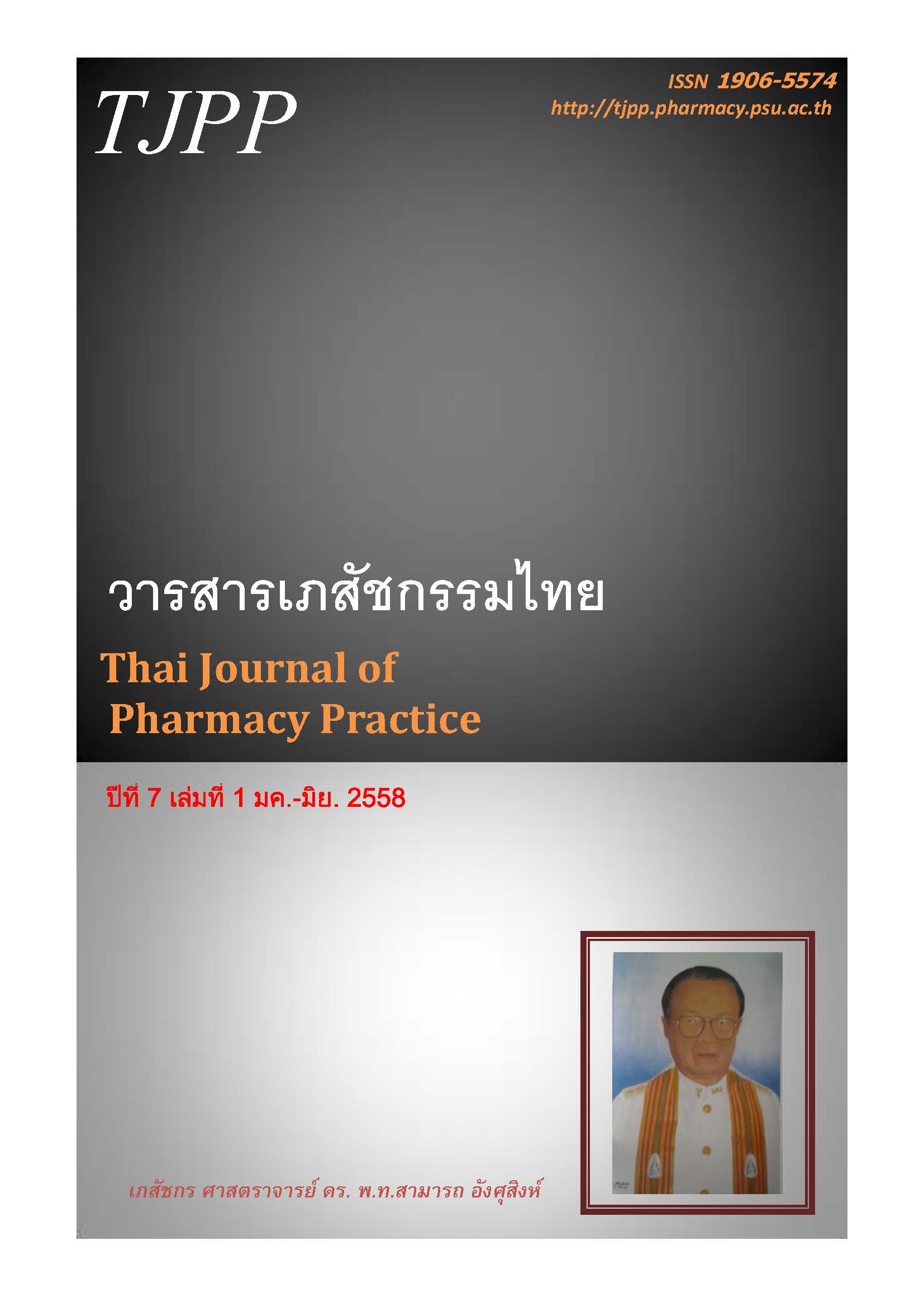ปัจจัยที่มีผลต่อความร่วมมือในการใช้ยาของผู้ป่วยเบาหวาน ณ โรงพยาบาลตำรวจ
Main Article Content
บทคัดย่อ
วัตถุประสงค์: เพื่อศึกษาความชุกของความไม่ร่วมมือในการใช้ยาของผู้ป่วยเบาหวาน ณ โรงพยาบาลตำรวจ และปัจจัยที่มีผลต่อความร่วมมือในการใช้ยา วิธีการวิจัย: การศึกษาเชิงพรรณนาแบบภาคตัดขวางนี้รวบรวมข้อมูลจากเวชระเบียนและการสัมภาษณ์ผู้ป่วยในปัจจัยที่วางสมมุติฐานไว้ว่ามีความสัมพันธ์กับความร่วมมือในการใช้ยา ตลอดจนการวัดความร่วมมือในการใช้ยาโดยใช้แบบประเมิน สถานที่วิจัย คือ คลินิกต่อมไร้ท่อ โรงพยาบาลตำรวจ ผลการวิจัย: ผู้ป่วยจำนวน 168 ราย มีคะแนนความร่วมมือในการใช้ยาเฉลี่ย 37.4±2.2 คะแนน (เต็ม 40 คะแนน) ความชุกของความไม่ร่วมมือในการใช้ยาเท่ากับร้อยละ 16.7 (28 ราย) จำนวนโรคเรื้อรังอื่น ๆ ที่เป็นร่วมด้วยมีความสัมพันธ์ในทางลบกับความร่วมมือในการใช้ยา (r = -0.179; P = 0.020) ผู้ที่มีอาชีพรับจ้าง/ขับรถโดยสาร/ขับรถแท็กซี่มีความร่วมมือในการใช้ยาเฉลี่ยต่ำกว่าอาชีพอื่น (P = 0.035) การวิเคราะห์ถดถอยพหุคูณพบ 3 ปัจจัยที่สัมพันธ์กับความร่วมมือในการใช้ยา ได้แก่ อาชีพรับจ้าง/ขับรถโดยสาร/ขับรถแท็กซี่ (P = 0.018) อาชีพ แม่บ้าน/พ่อบ้าน/เกษียณอายุ (P = 0.030) และจำนวนโรคเรื้อรังอื่น ๆ ที่เป็นร่วมด้วย (P = 0.003) สรุป: ผู้ป่วยส่วนใหญ่มีความร่วมมือในการใช้ยา โดยผู้ป่วยที่มีโรคเรื้อรังร่วมด้วยหลายโรค มีอาชีพรับจ้าง/ขับรถโดยสาร/ขับรถแท็กซี่ จะมีความร่วมมือในการใช้ยาเฉลี่ยต่ำกว่าผู้ป่วยกลุ่มอื่นอย่างมีนัยสำคัญทางสถิติ ซึ่งควรได้รับการดูแลและหาแนวทางแก้ปัญหาหากพบปัญหาการไม่ใช้ยาตามสั่ง
Article Details
ผลการวิจัยและความคิดเห็นที่ปรากฏในบทความถือเป็นความคิดเห็นและอยู่ในความรับผิดชอบของผู้นิพนธ์ มิใช่ความเห็นหรือความรับผิดชอบของกองบรรณาธิการ หรือคณะเภสัชศาสตร์ มหาวิทยาลัยสงขลานครินทร์ ทั้งนี้ไม่รวมความผิดพลาดอันเกิดจากการพิมพ์ บทความที่ได้รับการเผยแพร่โดยวารสารเภสัชกรรมไทยถือเป็นสิทธิ์ของวารสารฯ
เอกสารอ้างอิง
2. Institue of Medical Research and Technology Assessment. Situation of diabtes/hypertension and their complications in Thailand. Bangkok: Ministry of Public Health; 2013.
3. Lydon D. Psychosocial factors impacting on treatment adherence in diabetes. Student psychology journal.1:171-87.
4. Clark M. Adherence to treatment in patients with type 2 diabetes. J Diabetes Nurs. 2004;8:386-91.
5. Teklay G, Hussien J, Tesfaye D. Non-adherence and associated factors among type 2 diabetic patients at jimma university specialized hospital, southwest Ethiopia. J Med Sci. 2013 1; 578-84.
6. Thapa B, Pokharel PK, Poudel IS, Sharma SK, Shyangwa PM, Sangraula H, et al. Factors affecting on adherence to the prescribed drugs in diabetic patients visiting a tertiary care centre. Journal of nobel medical college. 2013;2: 11-7.
7. Kumar P. A study on medication non-adherence in ambulatory diabetic patients and need for pharmacist intervention for improving patient adherence. Indian journal of research in pharmacy and biotechnology. 2013;1:446-7.
8. Ho PM, Rumsfeld JS, Masoudi FA, McClure DL, Plomondon ME, Steiner JF, et al. Effect of medication nonadherence on hospitalization and mortality among patients with diabetes mellitus. Arch Intern Med 2006;166:1836-41.
9. Ahmad NS, Ramli A, Islahudin F, Paraidathathu T. Medication adherence in patients with type 2 diabetes mellitus treated at primary health clinics in Malaysia. Patient Prefer Adherence 2013; 7: 525-30.
10. Mann DM, Ponieman D, Leventhal H, Halm EA. Predictors of adherence to diabetes medications: the role of disease and medication beliefs. J Behav Med 2009;32:278-84.
11. Adisa R, Alutundu MB, Fakeye TO. Factors contributing to nonadherence to oral hypoglycemic medications among ambulatory type 2 diabetes patients in Southwestern Nigeria. Pharmacy Practice. 2009;7:163-9.
12. Shams ME, Barakat EA. Measuring the rate of therapeutic adherence among outpatients with T2DM in Egypt. Saudi Pharm J. 2010;18: 225-32.
13. Park KA, Kim JG, Kim BW, Kam S, Kim KY, Ha SW, et al. Factors that affect medication adherence in elderly patients with diabetes mellitus. Korean Diabetes J. 2010;34:55-65.
14. Chaiman P. Factors associated with regular use of medications among type 2 diabetic patients at Kumuang, Burirum. [master thesis]. Bangkok: Mahidol University; 2009.
15. Budphakdee B. Medication compliance among diabetic patients received care from mobile health unit of Phutong health promoting district hospital in 2013. [online]. 2013 [cited 2013 Nov 4]. Available from: http://203.157.165.4/ssko_presents/filepre sents/3330501343786-8-1481.doc.
16. Wannapinyo A. Development and validation of an instrument to assess general knowledge and attitudes of patients with diabetes. [master thesis]. Bangkok: Chulalongkorn University; 2002.
17. Depression center, Prasrimahapho hospital. 9-items Depression scale (9Q). [online]. 2013 [cited 2014 Apr 15]. Available from: http://www.thaidep ression.com/www/56/298Q.pdf.
18. Lam PW, Lum CM, Leung MF. Drug non-adherence and associated risk factors among Chinese geriatric patients in Hong Kong. Hong Kong Med J. 2007;13:284-92.
19. Johnson M, Griffiths R, Piper M, Langdon R. Risk factors for an untoward medication event among elders in community-based nursing caseloads in Australia. Public Health Nurs. 2005;22:36-44.
20. Sthapornnanon N. Medication non adherence. Thai Bulletin of Pharmaceutical Sciences. 2012; 7: 1-17.
21. Srisawang A. Factors influencing adherence to antidepressants in Thai depressed patients[master thesis]. Bangkok: Chulalongkorn University; 2007.
22. Sujipittham T. Adherence assessment and factors affecting adherence to art among HIV-infected /AIDS at Taksin hospital. [master thesis]. Bangkok: Chulalongkorn University; 2010.
23. Kanchanarak O. Factors predicting medication adherence behavior of schizophrenic patients in community. [master thesis]. Bangkok: Chulalongkorn University; 2002.
24. Morisky DE, Ang A, Krousel-Wood M, Ward HJ. Predictive validity of a medication adherence measure in an outpatient setting. J Clin Hypertens 2008;10:348-54.
25. Manakitjongkol W. Use of the medication regimen complexity index (MRCI) to assess diabetic outpatient adherence at Saraburi hospital. [master thesis]. Bangkok: Chulalongkorn University; 2006.
26. Tiv M, Viel J-F, Mauny F, Eschwège E, Weill A, Fournier C, et al. Medication adherence in type 2 diabetes: The ENTRED study 2007, a French Population-Based Study. PLoS ONE. 2012;7: e32412.
27. Srisuwan N. Health behaviors for prediction blood glucose level of diabetic patients admitted at Samutprakarn hospital. [master thesis]. Bangkok: Chulalongkorn University; 2007.
28. Lohavisavapanich R. Impact of education and counseling provided by a clinical pharmacist on diabetic outpatients at King Chulalongkorn Memorial Hospital. [master thesis]. Bangkok: Chulalongkorn University; 2003.
29. Kalyango JN, Owino E, Nambuya AP. Non-adherence to diabetes treatment at Mulago Hospital in Uganda: prevalence and associated factors. Afr Health Sci. 2008;8:67-73.
30. Bezie Y, Molina M, Hernandez N, Batista R, Niang S, Huet D. Therapeutic compliance: a prospective analysis of various factors involved in the adherence rate in type 2 diabetes. Diabetes Metab. 2006;32: 611-6.
31. Kalsekar ID, Madhavan SS, Amonkar MM, Makela EH, Scott VG, Douglas SM, et al. Depression in patients with type 2 diabetes: impact on adherence to oral hypoglycemic agents. Ann Pharmacother. 2006;40: 605-11.
32. Donnan PT, MacDonald TM, Morris AD. Adherence to prescribed oral hypoglycaemic medication in a population of patients with Type 2 diabetes: a retrospective cohort study. Diabet Med. 2002;19:279-84.
33. Wabe NT, Angamo MT, Hussein S. Medication adherence in diabetes mellitus and self management practices among type-2 diabetics in Ethiopia. N Am J Med Sci. 2011;3:418-23.


